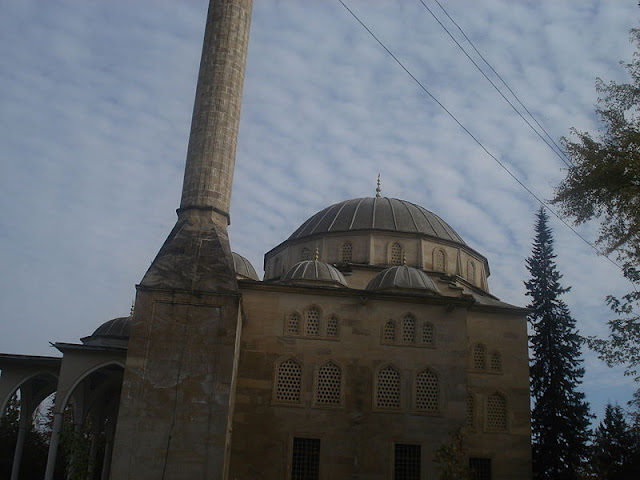 |
| Qusar City, Azerbaijan |
Qusar (also, Kusary) (Azerbaijani: Qusar, Lezgian: Кцlар) (Urdu: قوسار) - is a city in and the capital of the Qusar Rayon of Azerbaijan. Qusar is located in foothills of Greater Caucasus, over the Qusarchay River, 35 kilometers to south-west from Khudat railway station and 180 km far from Baku.In 1836, Mikhail Yuriyevich Lermontov visited Qusar , where he met with Haji Ali-efendi – a scientist-philosopher and there he heard “Ashiq Qarib” dastan from an eminent ahiq Lazgi Ahmad and after he wrote his famous work “Ashiq Qarib” based on its motifs. A home-museum of the poet is reserved in the city with a memorial plate, where are written famous lines of Lermontov:In 1938, Qusar settlement acquired a city status.
Etymology:
There exist many versions about origination of the city, but the most possible one is a version of Tamilla Khalilova – Candidate of History. Since the 7th century, conquest of the South Caucasus by Arabs began. According to historical data the Arabs reached a territory of present Qusar Rayon. Accordin to the historians version name of the river is originated from Arabian Al-Qausar. In translation from the Holy Quran into English “Al_Qausar – in translation means a river of abundance, that is a heaven river, water of which is whiter than milk and sweeter than honey. Its fragrance is nicer than musk and birds with beautiful long necks like necks of camels fly around it.” The settlement got its name from the river – Qusar. Modern historians believe that the name Qusar derives from khisar.
 |
| Mountain Shahdag. View from Kusary |
Geography and Climate:
Qusar is located in a zone of subtropical climate and the northern part of the rayon is in zone of mild climate. But because of the heights above the sea level and proximity of the mountains winter is always cold here, and summer is not hot. Temperature of air can change more than 15 degrees during a day. For instance, in summer incessant days-long rains can begin after hot weather.
The city is located not far from Bazarduzu, Shahdagh Mountains and a border with Russia. The mountain river Qusarchay, in honor of which the city acquired its name, flows in Qusar. There is also is an artificial lake - Violet.
Economy:
The economy of Qusar is partially agricultural, partially tourist based, with some industries in operation. There are tinned food, milk and asphalt factories in the city.
 |
| Street in Kusary (Qusar), Azerbaijan |
Culture and Education:
In 1998, the State Drama Theatre of Lezghins was opened in Qusar.
In 2008, 6 secondary schools, one of which is functioning in Azerbaijani and 5 in Russian languages, were functioned in the city. There are also two preschool education institutions in the city. There is also Azerbaijan State Pedagogical College, where study future teachers of Azerbaijani, English languages and literature, and also teachers of elementary classes.
Population:
According to “The Caucasian calendar” of 1916, there lived 1203 people, generally the Russians, in the territory of Qusar. In 1926, in Qusar lived 120 highland Jews, bit in 1939 – 241 Jews.
According to the census of 1959, more than 7366 people lived in Qusar. According to a census of 1979, population of the city consisted of 12225 people, but in 1989 it reached 14230.
97% of the population consists of Lezghins.
 |
| Bus-2203 to RAF Kusary |
Transportation:
Intracity transportation in Qusar is represented by buses RAF-2203 going from city bazaar along the whole city. There are only several intracity buses functioning in daytime. There is a bus station, from where the buses go to Quba, Baku and in the rayon, in the city.
Bridges:
- Old bridge
- New bridge
Sports:
There is a rock climbing club of Ilqar Israfilov, who is engaged in subjugation of mountains.
Sightseeing:
- Nariman Narimanov park
- House of Lermontov
- Square of General Mahmud Abilov
- Local history museum established in 1982. There are 3000 exhibits in the museum.
Famous natives:
Borshev Timofey Mikhaylovich – People’s Commissar of International Affairs of 5the Turkmenistan SSR (1938-1942)


 Lermontove House in Kusary (Qusar), Azerbaijan
Lermontove House in Kusary (Qusar), Azerbaijan




 Mount Shahdagh in Qusar (Kusary) Azerbaijan
Mount Shahdagh in Qusar (Kusary) Azerbaijan























